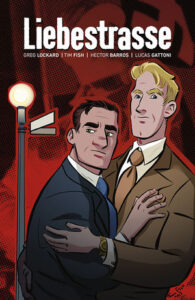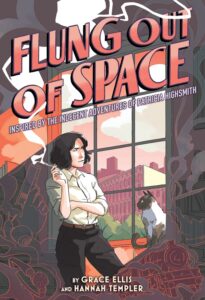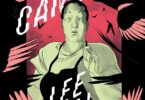Reviewed by Trevor James McNeil
Grace Ellis and Hannah Templer, Flung Out of Space (ABRAMS, 2022), 208 pp., $24.99 US.
Greg Lockard and Tim Fish, Liebestrasse (Dark Horse Comics, 2022), 128 pp., $19.99 US.
There is a notion among conservatives that LGBTQ2S+ folks have only existed since the 1960s—a blinkered opinion that utterly ignores landmark works of queer culture like The Importance of Being Earnest, first performed in 1895. Not to mention, to take things all the way back, the poems of Sappho, the Greek islander penning some of the most beautiful verses dedicated to passionate and unabashedly sexual woman-woman love.
 Celebrated editor and first-time author Greg Lockard understands this history. His debut work Liebestrasse— a variation on the German word for ‘exalted love’—opens in 1952 New York. Our hero, the stereotypically square-jaw American stud Sam, divides his time between his work as an executive at an international bank and the modern art gallery where he meets guys around the Rothkos. One of the ‘secret gays’ who had a thriving community in New York since the 1890s, Sam has a relatively good life. Things turn on a dime when he is sent by his bank to Berlin, which has been occupied by the ‘Four Armies’: Britain, the United States and France in the western section, and the notorious ‘Russian Sector’ to the east. There are already whispers of a wall to be built between the western and eastern sections when Sam arrives.
Celebrated editor and first-time author Greg Lockard understands this history. His debut work Liebestrasse— a variation on the German word for ‘exalted love’—opens in 1952 New York. Our hero, the stereotypically square-jaw American stud Sam, divides his time between his work as an executive at an international bank and the modern art gallery where he meets guys around the Rothkos. One of the ‘secret gays’ who had a thriving community in New York since the 1890s, Sam has a relatively good life. Things turn on a dime when he is sent by his bank to Berlin, which has been occupied by the ‘Four Armies’: Britain, the United States and France in the western section, and the notorious ‘Russian Sector’ to the east. There are already whispers of a wall to be built between the western and eastern sections when Sam arrives.
‘Whisper’ is the operative word though, as Lockard is refreshingly light with the foreshadowing and brutality, focusing instead on the delirious dream of post-WWI Europe when Sam invariably flashes back to his first visit in 1942. Here, the narrative becomes a lovely if tragic love story between Sam and Phillip, a tall and beautiful German who befriends him. Their forbidden relationship unfolds in a place and time where going against society’s idea of morality carried a death sentence.
The German government of the time has a place in the story. Ignoring it would be intellectually dishonest, but Lockard, and illustrator Tim Fish, give them the treatment they deserve. Showing them as either absurd and delusional or like literal monsters. The latter is especially clear with the foot-soldiers, who are mostly rendered as boots, long black-coats and helmets, the latter of which obscure their eyes. Compare this to the British soldiers Sam asks directions on his return to Berlin, dressed in functional greens topped with stylish berets, their unthreatening boyish faces clearly seen, and it is obvious where Lockard’s and Fish’s sensibilities lie.
 Set around the same time, Flung Out of Space by Grace Ellis and Hannah Templer takes a warts and all approach to a giant of LGBTQ2S+ cultural history. Perfectly illustrated by Templer in a style that walks the line between realistic and cartoonish, the lengthy graphic novel relates the story of Patricia Highsmith, the author of such crime fiction classics as Strangers On A Train and The Talented Mr. Ripley.
Set around the same time, Flung Out of Space by Grace Ellis and Hannah Templer takes a warts and all approach to a giant of LGBTQ2S+ cultural history. Perfectly illustrated by Templer in a style that walks the line between realistic and cartoonish, the lengthy graphic novel relates the story of Patricia Highsmith, the author of such crime fiction classics as Strangers On A Train and The Talented Mr. Ripley.
Beginning in her early years, Ellis and Templer chronicle Highsmith’s days as a staff writer for various comic book companies. She is going uncredited on all of her books at her own insistence, thinking that comics were beneath her talents. When Marvel founder Stan Lee, then still known as Stanley Leiber, confronts her about the fact that she wrote crime novels, she replies “I don’t write crime novels. I write good novels. With criminal elements.”
By no means a pleasant person, especially the standards held for women at the time, Highsmith is presented as a low-key misanthrope who is not particularly fond of anyone including herself. She does seem very fond of her cat, Spider, rendered in adorable detail by Templer. Highsmith tells her: “You’re the only one I’ll ever love, Spider.”
The usual assumptions come up, particularly about Highsmith’s stated antisemitism. While Ellis describes Highsmith’s beliefs as “nothing short of evil” in the author’s note, she does not seem to consider that Highsmith, a deeply closeted lesbian, had no less than two affairs with Jewish women and that some of her subsequent antisemitic statements were possibly a complicated deflection tactic.
Later Highsmith wrote The Price of Salt, later known as Carol, the first ‘lesbian story’ with a happy ending. This flew in the face of the laws at the time that dictated that any stories with LGBTQ characters had to maintain ‘moral standards’—be it one member of a lesbian relationship returning to her husband, or one or both members of a same-sex pairing dying at the end—Highsmith gave generations of LGBTQ readers comfort and inspiration. The latter part of Flung Out Of Space is largely dedicated to her writing the book and the struggle she went through getting it published, including compromises such as the title change and writing under a pseudonym.
Reflecting the lives of queer people in the post war era, when queerness was less likely to get you executed but was still illegal most places even in the ‘free world’, both Flung Out of Space and Liebestrasse help to not only show that queer folks have been around for a while, but also illustrate the variety in experience within the queer community, both then and now. These works reflect on the basic humanity of all of us, be it in terms of existing against the backdrop of global politics as in Liebestrasse, or the more personal conflicts explored in Flung Out of Space, where the greatest enemy being faced might be the self.
 Growing up in the far north, Trevor James McNeil had little to do other than read when the temperature went below 40 Celsius, and he developed an affinity for stories of all sorts. Graduating from the University of Victoria in 2009, he has been reading and writing in some way since. He lives in a cabin in the woods with his dog, and firmly believes The Smiths would have been better as a trio.
Growing up in the far north, Trevor James McNeil had little to do other than read when the temperature went below 40 Celsius, and he developed an affinity for stories of all sorts. Graduating from the University of Victoria in 2009, he has been reading and writing in some way since. He lives in a cabin in the woods with his dog, and firmly believes The Smiths would have been better as a trio.






